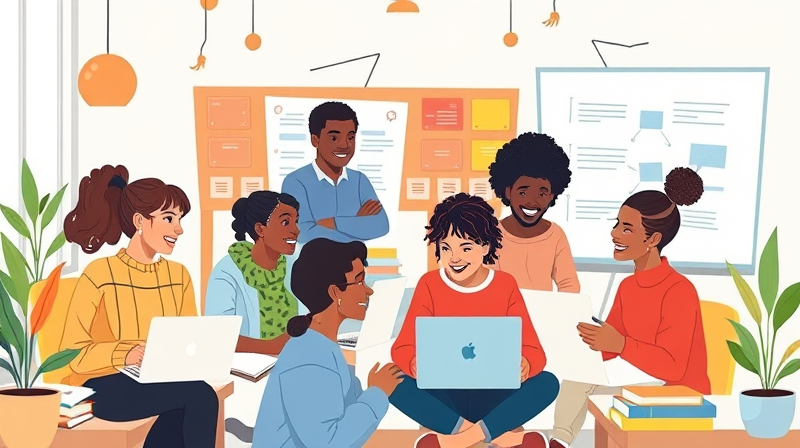Education is the gateway to success, and in today's digital world, free online study resources have become a powerful means for learners to advance their knowledge without financial barriers. Millions of students and professionals are turning to digital platforms to gain access to quality content that spans from academic theories to practical skills. This article explores effective strategies for tapping into the vast pool of free educational materials and offers insights into how users can tailor these resources to meet their individual learning goals.
One of the most appealing aspects of free online education is the sheer variety of available resources. Whether you are preparing for an exam, entering a new field, or simply pursuing a personal interest, there is a platform or tool available to assist you. Embracing these opportunities can create a dynamic and engaging learning experience that is both flexible and affordable.
Massive Open Online Courses (MOOCs)
MOOCs have revolutionized the accessibility of education. These courses are offered by some of the world’s most prestigious universities and institutions, making them a valuable resource for anyone eager to learn. Many platforms allow users to audit courses for free, offering access to lectures, assignments, and supplemental materials that provide a comprehensive learning experience.
Popular platforms like Coursera and edX allow learners to explore subjects ranging from computer science to humanities. Meanwhile, sites such as MIT OpenCourseWare and Modern States offer extensive catalogs of lectures, reading materials, and even exam preparation content. For many, these platforms create the ideal environment for self-paced learning and provide opportunities that were once restricted to traditional classroom settings.
- Coursera: With courses from renowned institutions, users can learn about topics like Python programming and business analytics, among others.
- edX: Offers access to courses from top universities, including Harvard and Berkeley, with subjects ranging from computer science to the humanities.
- MIT OpenCourseWare: Features a comprehensive repository of courses covering diverse subjects including psychology, economics, and mathematics.
- Modern States: Provides free content aimed at preparing students for college credit exams like the CLEP.
The flexibility of MOOCs is enhanced by features like free auditing and modular lesson plans, which allow learners to focus on specific topics without committing to a full program. This modularity is particularly inspiring for those balancing education with personal and professional responsibilities.
Leveraging Specific Learning Platforms
The internet offers specialized platforms that target particular learning areas. For example, those interested in coding have access to an array of free resources. Platforms like Khan Academy, freeCodeCamp, and Codecademy provide interactive lessons, video tutorials, and even certification programs that are accessible to beginners and advanced users alike.
Language learning and creative skills have similarly benefited from digital platforms. Duolingo, for example, uses a gamified approach to make learning new languages both fun and effective. The focus on interactive activities and real-time feedback helps users stay motivated and achieve fluency over time.
- Khan Academy: Offers comprehensive tutorials for K-12 students and early college courses in subjects such as STEM, history, and test preparation.
- freeCodeCamp: Provides coding tutorials and projects that cover web development, data visualization, and more.
- Codecademy: Features interactive coding lessons in languages such as JavaScript, HTML, and Python.
- Duolingo: Makes language learning engaging through a gamified platform covering multiple languages.
These platforms not only deliver high-quality educational content but also meet the needs of various learning styles, whether visual, interactive, or auditory. The tailored experiences offered by these tools are crucial for maintaining motivation and achieving learning milestones.
Accessing Open Educational Resources (OERs)
Beyond structured courses, open educational resources (OERs) offer textbooks, research papers, and eBooks at no cost. OERs empower learners by providing ready access to comprehensive academic materials that might otherwise be expensive or hard to obtain.
Libraries such as Project Gutenberg and Internet Archive host vast collections of texts that span academic subjects and classic literature. These collections are a treasure trove for students, educators, and lifelong learners who are eager to explore in-depth content in a variety of fields.
- OpenStax: Provides free, peer-reviewed textbooks covering subjects like biology, mathematics, and business.
- Project Gutenberg: Offers access to over 75,000 free eBooks, including timeless literary classics and academic texts.
- Internet Archive: Contains a wide range of educational materials, from historical texts to recorded lectures.
Diving into OERs allows learners to supplement course materials with authentic academic texts and resources that enrich understanding and support independent research.
Utilizing Study Tools and Virtual Communities
Boosting study efficiency is another aspect where free online tools shine. Applications like Grammarly help refine writing skills, while specialized apps like Hippocampus present multimedia content that caters to visual learners. In addition, digital communities such as online forums and virtual study groups offer avenues for collaborative learning and shared resources.
Platforms such as Google Scholar and Digital Defynd further empower users by aggregating free academic papers and courses from renowned institutions. This advanced search capability is particularly valuable for those engaged in research and higher education.
- Grammarly: Enhances academic writing by providing real-time grammar and spelling feedback.
- Hippocampus: Utilizes multimedia content to explain complex subjects and stimulate visual learning.
- Google Scholar: Acts as a bridge to free academic research, connecting users with open-access articles and studies.
- Digital Defynd: Curates free online courses from institutions like Harvard and Stanford, covering a wide range of subjects.
Digital communities also play a pivotal role by fostering an environment where learners can share insights, swap resources, and provide mutual support. The influence of peer recommendations and expert talks creates an atmosphere where continuous learning is both inspiring and collaborative.
Lastly, aligning educational pursuits with personal and professional goals is crucial. Evaluating the quality of content, credentials of content providers, and the learning outcomes expected from the resource are essential steps. When these factors are carefully considered, the transformation in learning efficiency can be profound, making education an engaging and rewarding journey.
In conclusion, the abundance of free online study resources has opened new avenues for learning and personal growth. The strategies discussed—from enrolling in MOOCs and leveraging particular learning platforms to exploring open educational repositories—highlight the exciting prospects available in the digital age. Whether you are a student, a professional, or a lifelong learner, these resources provide an empowering way to acquire knowledge and skills without the burden of financial constraints.
This comprehensive approach to online learning is a call to action: embrace the digital revolution and take charge of your education today. With the right resources, the power to learn and grow is truly at your fingertips.








